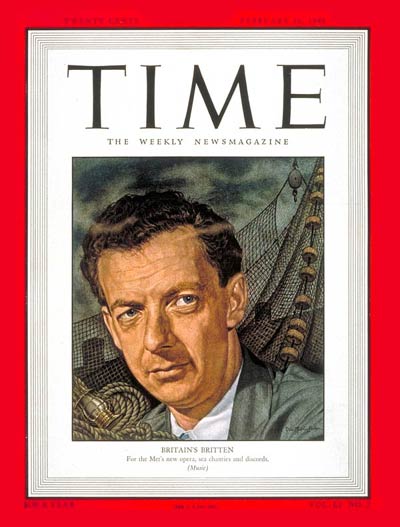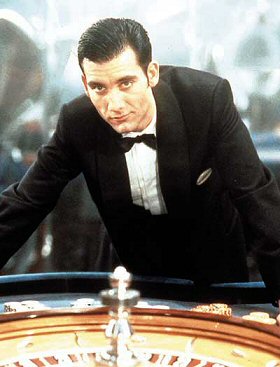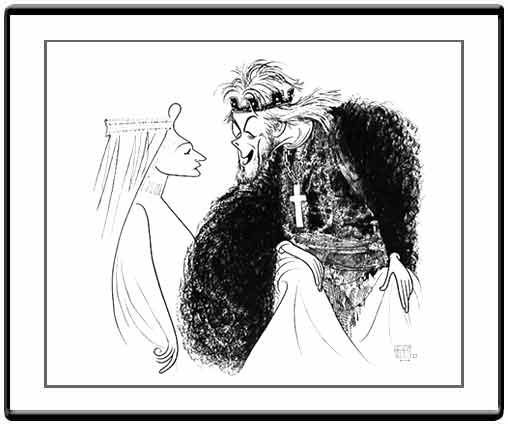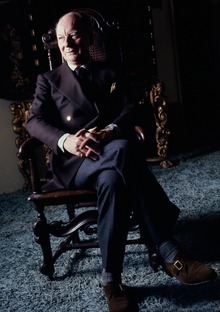In today’s Wall Street Journal I review an important revival in Orlando, Florida, Mad Cow Theatre’s production of Laughter on the 23rd Floor. Here’s an excerpt.
* * *
 Long before Neil Simon was America’s hottest playwright, he was the youngest writer on the staff of NBC’s “Your Show of Shows.” Still fondly remembered by octogenarian connoisseurs of TV comedy, “Your Show of Shows,” which aired from 1950 to 1954, was a weekly series starring Sid Caesar and Imogene Coca that featured some of the best comic sketches ever to grace the small screen. The movie “My Favorite Year” was inspired by “Your Show of Shows,” and in 1993 Mr. Simon turned his own memories of working on the show into “Laughter on the 23rd Floor,” a very thinly disguised roman à clef about the writers of a variety series called “The Max Prince Show.”
Long before Neil Simon was America’s hottest playwright, he was the youngest writer on the staff of NBC’s “Your Show of Shows.” Still fondly remembered by octogenarian connoisseurs of TV comedy, “Your Show of Shows,” which aired from 1950 to 1954, was a weekly series starring Sid Caesar and Imogene Coca that featured some of the best comic sketches ever to grace the small screen. The movie “My Favorite Year” was inspired by “Your Show of Shows,” and in 1993 Mr. Simon turned his own memories of working on the show into “Laughter on the 23rd Floor,” a very thinly disguised roman à clef about the writers of a variety series called “The Max Prince Show.”
Mr. Simon’s career was in terminal decline by then, and “Laughter on the 23rd Floor” ran for just nine months on Broadway. But TACT/The Actors Company Theatre’s 2012 Off-Broadway revival of “Lost in Yonkers” was so noteworthy that I’ve been seeking out regional productions of Mr. Simon’s other plays to see how they hold up. That’s what brought me to Orlando’s Mad Cow Theatre, which mounted an impressive “Rosencrantz and Guildenstern Are Dead” in 2010 and is now doing “Laughter on the 23rd Floor.” While Mr. Simon is no Tom Stoppard, Mad Cow’s “Laughter on the 23rd Floor” is pulverizingly funny. Not only does the play work, but this production, directed by David Russell, is a case study in how to stage punch-line humor. It doesn’t just make you laugh–it rips the laughs out of you.
“Laughter on the 23rd Floor” doesn’t have much of a plot: NBC wants Max Prince (Philip Nolen) to dumb down his program in order to satisfy the small-town rubes, and he responds by declaring war on the network. While that really did happen to “Your Show of Shows,” it feels like a contrivance, an excuse for comedy. Fortunately, the real point of “Laughter on the 23rd Floor” is not Max’s relationship with the network but his relationship with his writers, who have no illusions about their half-crazy boss. As one of them explains, “Max gets in his limo every night after work, takes two tranquilizers the size of hand grenades and washes it down with a ladle full of scotch.” That’s a recipe for trouble, and for lunatic slapstick.
The excellence of this revival lies in the kill-or-be-killed ferocity with which the actors tear into the script, taking their cue from this exchange between Val (Tim Williams), the head writer, and Kenny (David Almeida), the show’s resident egghead: “A little aggression is good for writers. All humor is based on hostility, am I right, Kenny?” “Absolutely. That’s why World War II was so funny. Schmuck.” Everybody in the cast, especially Mr. Williams, throws their punches savagely hard, knowing that the Jewish humor in which Max’s writers specialize is rooted in anger–and honesty….
* * *
Read the whole thing here.
Sid Caesar and Imogene Coca in “The Recital,” a sketch from Your Show of Shows:

 Yet critics as a group have been slow to admit Britten to the pantheon of top-tier composers. His unfailingly accessible, straightforwardly beautiful music, like that of Aaron Copland, his opposite number in America, is widely–if by no means universally–thought to be too “easy” to be great. But there’s more to it than that. Throughout his life and to this day, Britten’s reputation has risen and fallen for reasons that have at least as much to do with his complex personality.
Yet critics as a group have been slow to admit Britten to the pantheon of top-tier composers. His unfailingly accessible, straightforwardly beautiful music, like that of Aaron Copland, his opposite number in America, is widely–if by no means universally–thought to be too “easy” to be great. But there’s more to it than that. Throughout his life and to this day, Britten’s reputation has risen and fallen for reasons that have at least as much to do with his complex personality. I’m supposed to keep it short, and I approve of that. In case you’ve never heard it, this is the Drama Critic’s Prayer: Dear God, if it can’t be good, let it be short. So I’ll be brief–and, I hope, to the point. I’m here to ask all of you a tough question: exactly why do you want to be on Broadway?
I’m supposed to keep it short, and I approve of that. In case you’ve never heard it, this is the Drama Critic’s Prayer: Dear God, if it can’t be good, let it be short. So I’ll be brief–and, I hope, to the point. I’m here to ask all of you a tough question: exactly why do you want to be on Broadway? Now let’s suppose that you’re not a casino gambler, but a Broadway gambler. You’re not an addict, you’re not a fool, you’re a person who goes in with his eyes wide open. You know that you’re shooting craps. You’re betting against the house. You’ve only got one chance in four of succeeding, and you’ve been around long enough to know that there’s nothing much you can do to change the odds. Sometimes good shows hit, and sometimes they don’t. Sometimes bad shows hit, and sometimes they don’t. What William Goldman said about Hollywood goes double on Broadway: nobody knows anything. And that means that there’s only one reason for you to be on Broadway–and that’s to have fun.
Now let’s suppose that you’re not a casino gambler, but a Broadway gambler. You’re not an addict, you’re not a fool, you’re a person who goes in with his eyes wide open. You know that you’re shooting craps. You’re betting against the house. You’ve only got one chance in four of succeeding, and you’ve been around long enough to know that there’s nothing much you can do to change the odds. Sometimes good shows hit, and sometimes they don’t. Sometimes bad shows hit, and sometimes they don’t. What William Goldman said about Hollywood goes double on Broadway: nobody knows anything. And that means that there’s only one reason for you to be on Broadway–and that’s to have fun. • You can make a risky show that isn’t a hit. Consider Lincoln Center Theater’s revival of Clifford Odets’ Golden Boy. It was brilliant. Every critic in town went nuts over Golden Boy, as well they should have. Because Lincoln Center went back to the well and revived a classic American play that nobody does, a show that hadn’t been seen on Broadway since 1952…and they did it right. No creative compromises. No unsuitable movie stars. Nothing but a great script and a great production. And no, it didn’t exactly make the box-office needle bounce–but everybody involved with that production is proud to say that they worked on Golden Boy, because everybody who bought a ticket to see it was stunned speechless by how great it was. I can tell you, it was the kind of show that makes people cry. Lots of people.
• You can make a risky show that isn’t a hit. Consider Lincoln Center Theater’s revival of Clifford Odets’ Golden Boy. It was brilliant. Every critic in town went nuts over Golden Boy, as well they should have. Because Lincoln Center went back to the well and revived a classic American play that nobody does, a show that hadn’t been seen on Broadway since 1952…and they did it right. No creative compromises. No unsuitable movie stars. Nothing but a great script and a great production. And no, it didn’t exactly make the box-office needle bounce–but everybody involved with that production is proud to say that they worked on Golden Boy, because everybody who bought a ticket to see it was stunned speechless by how great it was. I can tell you, it was the kind of show that makes people cry. Lots of people. Hayward got red in the face, banged on the desk, and said, “No, no, Max! Suppose there were absolutely no problems in getting anyone in the world you wanted. Who would you pick?”
Hayward got red in the face, banged on the desk, and said, “No, no, Max! Suppose there were absolutely no problems in getting anyone in the world you wanted. Who would you pick?” One of them was written after he saw a 1965 Metropolitan Opera production of Aida that starred Richard Tucker, whom Gielgud referred to as “Radames in a tea-cosy gold helmet on top of a fat Jewish face. He is a cantor at one of the synagogues and looks like it. 35 dollars a ticket and a hideous audience for some Israelite Benefit.”
One of them was written after he saw a 1965 Metropolitan Opera production of Aida that starred Richard Tucker, whom Gielgud referred to as “Radames in a tea-cosy gold helmet on top of a fat Jewish face. He is a cantor at one of the synagogues and looks like it. 35 dollars a ticket and a hideous audience for some Israelite Benefit.”